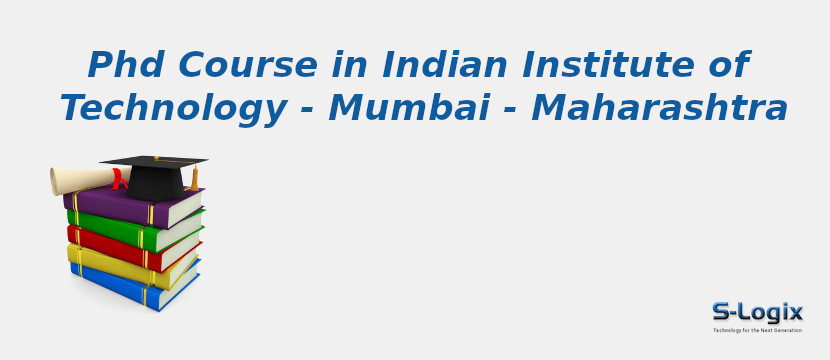Established in 1958,the second of its kind,IIT Bombay was the first to be set up with foreign assistance.The funds from UNESCO came as Roubles from the then Soviet Union.In 1961 Parliament decreed the IITs as Institutes of National Importance.Since then,IITB has grown from strength to strength to emerge as one of the top technical universities in the world.The institute is recognised worldwide as a leader in the field of engineering education and research. Reputed for the outstanding calibre of students graduating from its undergraduate and postgraduate programmes,the institute attracts the best students from the country for its bachelors, masters and doctoral programmes.Research and academic programmes at IIT Bombay are driven by an outstanding faculty,many of whom are reputed for their research contributions internationally.
PhD Courses Offered By Indian Institute of Technology
•
Computer Science And Engineering
• Mathematics
• Physics
•
Chemistry
• Biotechnology
• Civil Engineering
• Technology and Development
• Aerospace Engineering
• Human Resource Management
•
Nano Science and Technology
• Urban Engineering
• Chemical Engineering
• Mechanical Engineering
• Environmental Science & Engineering
• Electrical Engineering
• Information Technology
•
Quantitative Techniques
• Natural Resources
• Energy Science And Engineering
• Industrial Engineering
• Educational Technology
•
Instrumentation and Control
• Technology Management
Address: IIT Bombay, Powai, Mumbai 400 076, Maharashtra, India
Phone: +91 (22) 2572 2545
Email: nandk@chem.iitb.ac.in
Website: https://www.iitb.ac.in/
• Theoretical Computer Science
• Artificial Intelligence and Machine Learning
• Formal Methods
• Computer Networks and Systems
• Distributed Systems and Cloud Computing
• Programming Languages and Compilers
• Database and Information Systems
• Software Engineering
• Visual Computing
• Real-Time and Embedded Systems
• Security and Cryptography
• Computer Architecture
Theoretical Computer Science
• Algorithms
• Combinatorial optimization
• Combinatorics
• Complexity theory
• Cryptography
• Geometric algorithms
• Graph theory.
Artificial Intelligence and Machine Learning
• Data-Mining
• Information Retrieval
• Machine Translation
• Natural Language Processing
• Neural networks and Deep Learning
• Pattern Recognition
• Reinforcement Learning
• Sentiment Analysis
• Speech Recognition
• Game Theory and Mechanism Design.
Formal Methods
Formal specification, design and verification of hardware and software systems. Logic, automata theory and their applications in reasoning about systems. Automated theorem proving, Model checking, Reachability analysis of large and infinite state spaces: exact and approximate techniques.
Computer Networks and Systems
Performance modeling, Analysis and design of wired and wireless networks. Implementation and verification of network security protocols. Deployment, data management, communication and energy-efficiency issues in sensor networks. Design of content distribution networks for data dissemination. Architectures and protocols for metro optical networks, Network algorithms, Utility and pricing models. Quality-of-service protocols, Mobile computing, Voice routing, Voice over IP, RFID networks, Enterprise networks, Access and broadband networks, Telecommunication networks, Carrier Ethernet Switch routers.
Distributed Systems and Cloud Computing
Performance evaluation, fault tolerance and scalability issues in distributed systems. Distributed object-based systems, Programming models and runtimes for generic agents, Parallel computing, High performance cluster computing, Distributed operating systems. Self-configuration using abstract performance and capacity models of distributed component based applications, Topology based problem detection and root cause isolation in enterprise environments. Adaptive service orientation, Managing virtualization and server consolidation in clouds.
Programming Languages and Compilers
• Theory of code optimization
• Optimizing and parallelizing compilers
• Analysis and implementation of functional and logic programming languages
• Theory of programming languages.
Database and Information Systems
• Object oriented
• temporal and parallel databases
• Query optimization and transaction management. Real-time databases systems
• Indexing multidimensional data
• Wide-area distributed database systems
• Data dissemination systems
• Data warehousing and database and application security.
Software Engineering
• Object oriented software development
• Component architectures. Re-engineering of software. Systems analysis and design
• MIS systems
• Project management
• Quality assurance.
Visual Computing
Computer graphics, Geometry processing, Image and signal processing, Computer vision, Medical image computing. Rendering (photorealistic, non-photorealistic, real-time, immersive); animation (character, physics-based); sketch-based systems; augmented and virtual reality; camera and imaging systems. Image and geometry reconstruction; restoration; compressed sensing; compression; pattern recognition; localization; segmentation; tracking; registration; quantization; shape analysis; group analysis; retrieval; affective computing. Machine learning methods; deep learning; matrix analysis; statistical methods.
Real-Time and Embedded Systems
• Functional programming applications
• Reconfigurable computing
• Automobile telematics
• Embedded control units
• Design and development of robots and sensor platforms.
Security and Cryptography
• Information security
• Theoretical and applied cryptography
• Side-channel attacks and cryptanalysis
• Privacy.
Computer Architecture
Data and instruction cache optimizations for emerging (server, desktop, mobile, domain-specific) workloads, microarchitecture optimizations for address translation in virtualized environments, memory hierarchy for persistent memory systems, Energy-efficient memory hierarchy for mobiles and servers, transient execution and timing attacks, secure processor and memory hierarchy, trusted execution environments like Intel SGX and ARM TrustZone, attack detectors, security-performance tradeoffs.
